A master class
‘There is a real element of respect in Japan.’ So says Lesley Downer, pictured right taking tea, whose latest book is a history of the country she loves. Dan Carrier reports
Thursday, 22nd August 2024 — By Dan Carrier
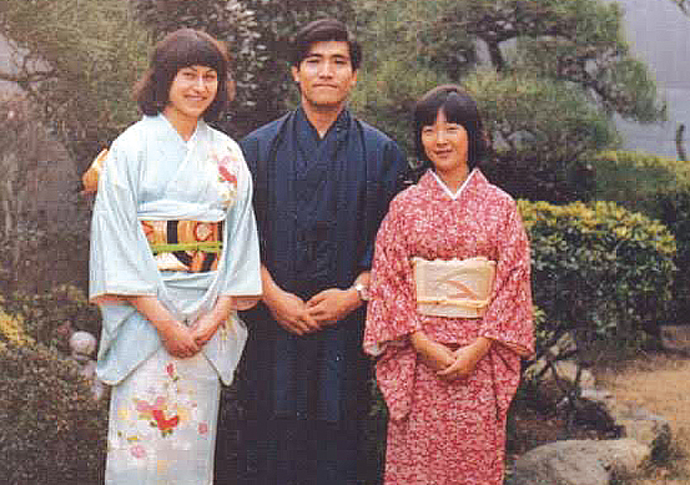
Lesley trying in a traditonal kimono on during her first visit to Japan
CONFUCIANISM is a humanistic philosophy and while it developed in ancient China, its tenets of humanity, propriety, good conduct and wisdom mimic the four tenets of the ancient Greek Stoics.
This thoughtful philosophy seeped from China across Asia over centuries and today its ongoing influence can be seen every day in Japan.
Historian and journalist Lesley Downer’s new book, The Shortest History of Japan, has allowed the South End Green-based writer to bring together a lifetime of study.
And the writer explains it is the impact of Confucius and Buddhism that has created a society that today pays close attention to custom, manners and doing things well.
Lesley first moved to Japan in 1978 and has during her career spent large chunks of time working there.
Her journey began as a teacher of English: she was asked to help with a translation in return for Japanese lessons and this sparked a lifelong interest.
Shortly after, posts were advertised by the Japanese government for English teachers to work in schools – and so after an interview at the embassy, Lesley found herself heading east.
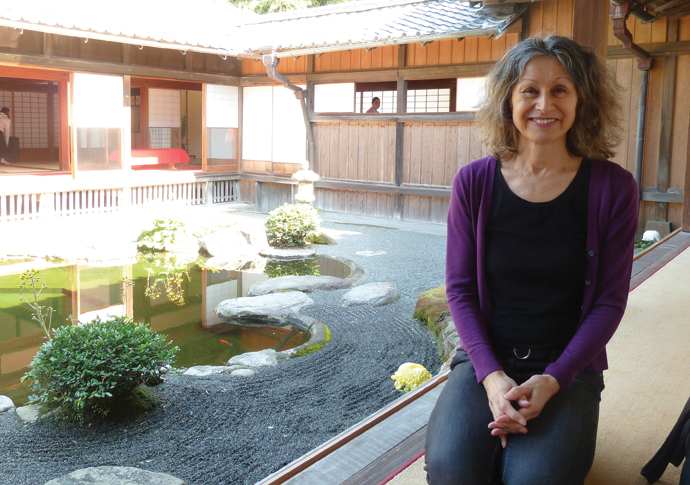
Lesley in Kagoshima in 2018
Her first job was selected due to a misunderstanding – and was an introduction to the many characteristics of Japanese language.
“I was asked if I wanted to teach in a city or the countryside,” she recalls.
“I thought: countryside – cows, goats and sheep, great. But the correct translation would be the provinces – and I found myself in a small, isolated, heavily industrialised city in the north.”
She was given a job in a women-only university and quickly settled.
“I was the only westerner in a city of 100,000 people. I thought: this is great. I love travelling and meeting people.”
The language barrier needed to be overcome.
“I had a lot of the same conversations again and again,” she says of those early days.
And she quickly had to learn phrases that are not taught but were vital for getting by.
“One question I was asked frequently was if I was coming to something or going somewhere. I had to quickly learn ‘I have not decided yet.’
“And I was constantly asked if I was married – I was in my 20s and it was assumed I should be. I had to learn a phrase that explained why I was single: ‘I have not got anyone to marry.’
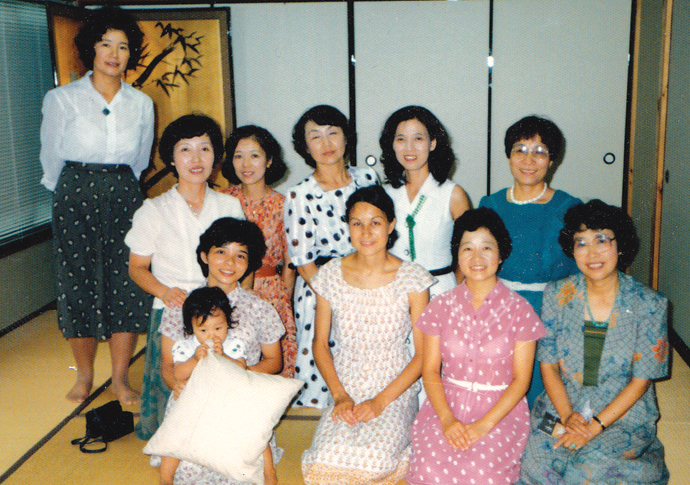
With friends and colleagues in Japan in 1980
Conquering the language also offered an insight into custom.
“It is a language where you say certain things in certain ways at certain times,” she says.
“You can get by pretty easily with basic words – but it is the correct usage that can be difficult. It takes a long time to learn the nuances of the right time to use different phrases and words. For example, there are many ways to say ‘I’. It can depend on how polite you need to be, if you are a man or a woman, and who you are speaking to. But people are unbelievably nice – especially to foreigners. They want to help you out. They are more Mediterranean than we are – open, welcoming and hospitable.
“People will talk to you in the supermarket queue – and that certainly helped me.”
Her first stint lasted four years and on her return she started planning how to fund another trip. She embarked on writing a Japanese vegetarian cook book, which was picked up by publishers Jonathan Cape. It set her on the way to becoming a journalist, working in Tokyo, as well as penning historical novels and factual books about her adopted home.
Her second book for Cape saw her travel in the footsteps of celebrated Haiku poet Matsuo Basho, who came from the north.
“I wanted to follow his travels,” she says.
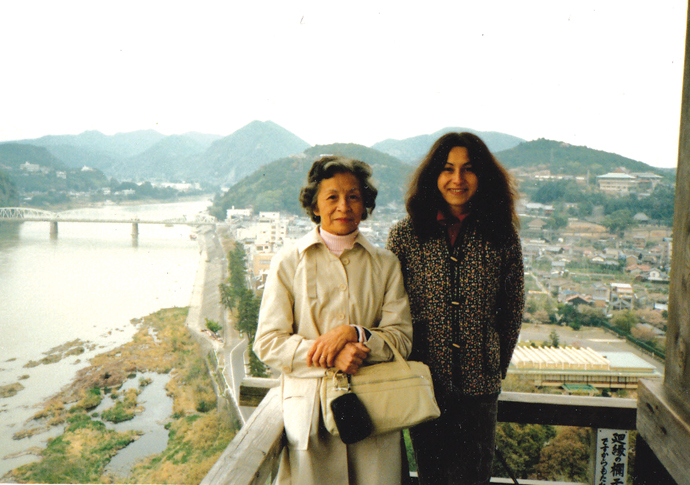
Lesley in Gifu with her mother in 1979
It was another educational experience.
“For my research, I went north and lived with farmers. I learnt new dialects and working-class voices. They were wonderfully cultured. They all knew Haikus and all about the poet Basho.
“They were extremely kind to me.”
One extraordinary adventure they set her on was a trip to the sacred mountains. The three peaks are full of ancient shrines and are a challenge to conquer – and contain a secret Lesley has vowed never to share with anyone else.
“In Japan, everything is Holy – nature, people. God is considered to be within all of us and everything around us.
“There are altars and shrines all over the place.
“At the sacred mountains, you go to incredible shrines and then you get to see what is considered divine.
“You see God – but you are not meant to tell anyone what you have seen.”
The evolution of beliefs, culture and custom are incredible concepts that are explained in her work, which pulls together decades of research.
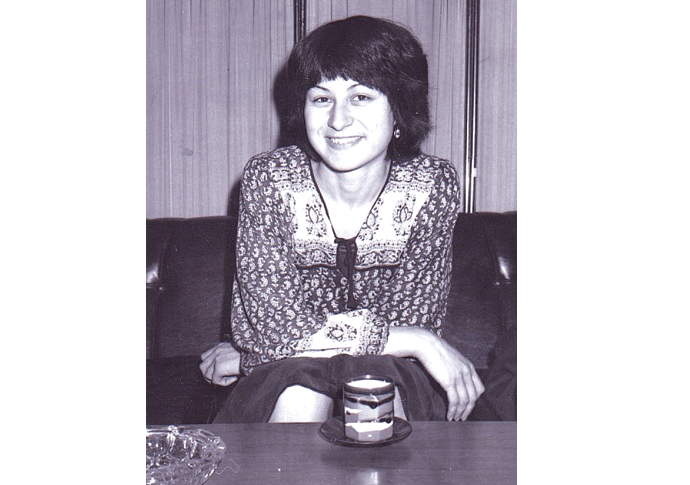
Lesley taking tea
As Japanese history is already neatly compartmentalised into eras and periods, often reflecting the ruler and type of government in charge. It gave Lesley a handy framework to walk the reader through the centuries in a concise way.
As a fan of early history, she had no qualms beginning the story back in 14,500 BC.
“I am a journalist, so I wanted it to be up to the minute – the story ends yesterday,” she adds.
“I came across tales that were intriguing and illustrative to use at the start of each chapter.
“I chose key events and I wanted to look at cause and effect.”
From tracing the roles of Shoguns and Samurai to poets, art and architecture, Lesley has written a hugely enjoyable and informative book that explains a country with a unique culture that has made a global impact.
Her work reveals how the Japan of today was formed.
“It has a strong Confucian background – and that is why it is such a peaceful and tranquil place,” she adds.
“There is a real element of respect – Confucianism has created the base for a society based on politeness.
“And this manifests itself in the pride taken in all forms of work.
“The road cleaners really want to get their street spotlessly clean,” she says.
“It is psychological. They take pride in whatever it is they are doing – whatever it is, they want to do it really well.
“Take the tea ceremony – it is about small gestures done just so. Nothing in Japan is about just ‘having a go.’
“To learn something, you go to a master. You’ll be training for 10 years and the first will be spent just floor sweeping, absorbing the atmosphere and watching.”
Since her first visit in 1978, Lesley has become a master of all things Japanese, and it makes her the perfect guide.
• The Shortest History of Japan. By Lesley Downer, Old Street Publishing, £14.99